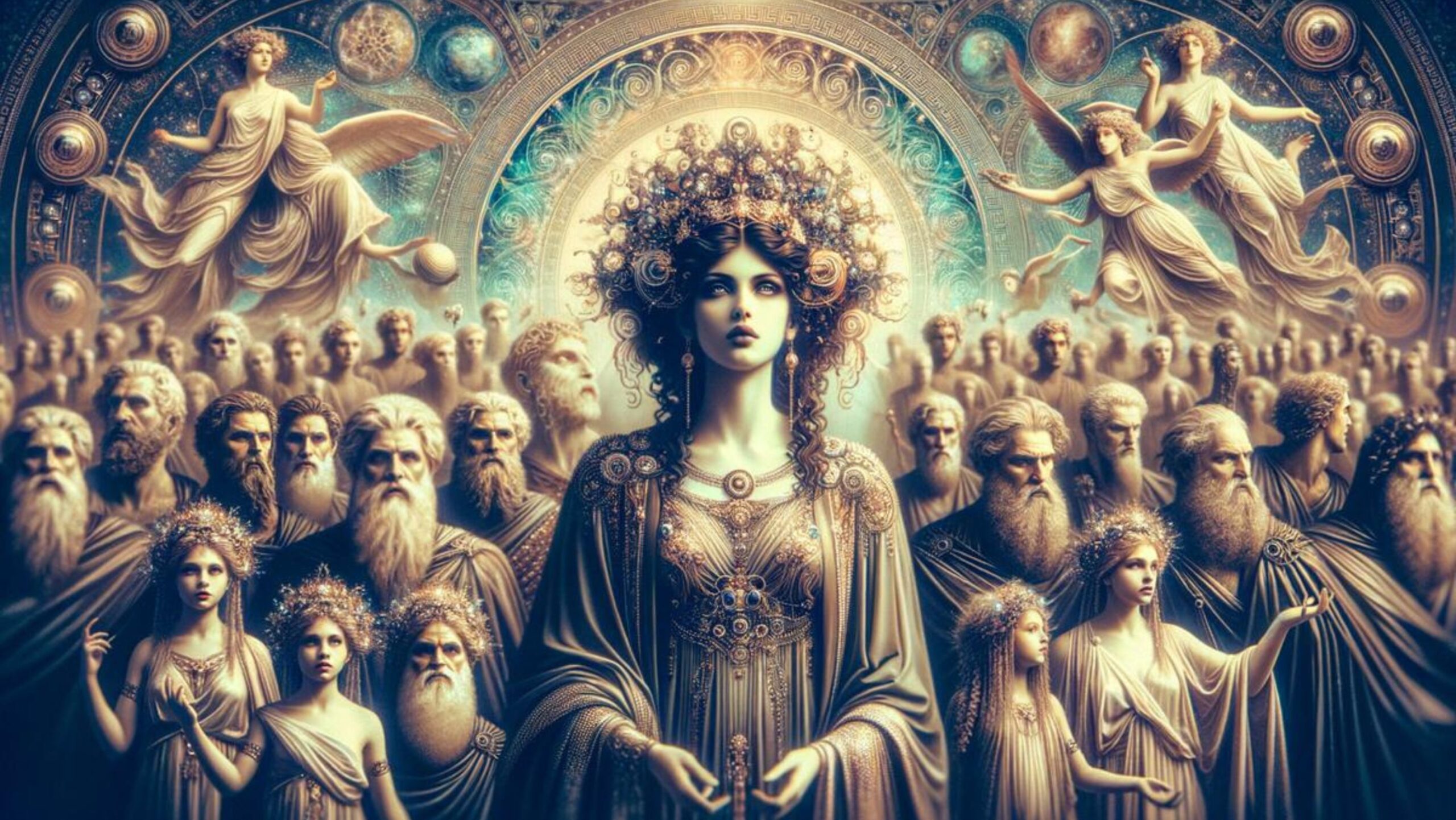You might think you know Greek mythology, but have you heard the tale of Phoebe? This Titan goddess was a true force to be reckoned with. Phoebe Titaness Mythology was all about prophecy and the moon – she had powers that would make even the bravest hero shake in their sandals.
But here’s the thing: Phoebe’s story is often overshadowed by those of the more famous gods and goddesses. It’s time to change that. I’m here to shine a light on this fascinating figure and show you just how important she was in the grand scheme of Greek mythology.
Table of Contents:
Who Was Phoebe in Greek Mythology?

In the grand tapestry of Greek mythology, Phoebe stands out as a remarkable figure. This ancient Greek Titan goddess was one of the divine beings that preceded the Olympian gods we’re so familiar with today, like Zeus and Athena.
Phoebe’s name itself holds clues to her nature. It signifies brightness and radiance, much like the forename “Phoebus” given to her grandson Apollo. In the Greek pantheon, Phoebe was associated with the shimmering moon, the power of prophecy, and the mysterious art of oracular visions.
As a Titan goddess, Phoebe belonged to that primordial generation of deities who emerged at the dawn of creation. According to the Greek poet Hesiod in his work “Theogony,” Phoebe was born to the primordial parents Gaia (Earth) and Uranus (Sky), making her part of the very foundations of the cosmos.
Phoebe’s Family Tree and Lineage: Phoebe Titaness Mythology
Phoebe’s family tree is a who’s who of Greek mythology. Her siblings included the mighty Titans like Cronus, Rhea, Themis, Oceanus, Tethys, Hyperion, Theia, Coeus, Crius, Mnemosyne, and Iapetus. Together, these powerful brothers and sisters overthrew their father Uranus and ushered in the age of the Titans.
But Phoebe’s influence extended far beyond her own generation. She married her brother Coeus, also a Titan, and their union produced some of the most significant figures in Greek mythology.
Their children included Leto, who would go on to bear the Olympian gods Apollo and Artemis, and Asteria, a goddess associated with nocturnal oracles and falling stars. Phoebe and Coeus were also the parents of Hecate, the formidable goddess of magic, crossroads, and ghostly apparitions.
Through her offspring, Phoebe became the grandmother of some of the most pivotal deities in the Greek pantheon. Her lineage intertwined with the Olympian gods, ensuring that her influence would be felt for generations to come.
Phoebe’s Role as a Prophetic Goddess

Among her many attributes, Phoebe was most renowned for her prophetic powers. In ancient Greek mythology, she was believed to have held sway over the famous Oracle of Delphi, one of the most important prophetic sites in the classical world.
Nestled on the slopes of Mount Parnassus, the Oracle of Delphi was where mortals and heroes alike would journey to seek divine guidance and glimpses of the future. It was said that Phoebe herself had originally presided over this sacred place, imbuing it with her gift of prophecy.
In a symbolic passing of the torch, Phoebe later bestowed the Oracle of Delphi upon her grandson Apollo. This gesture not only highlighted her own prophetic might but also foreshadowed Apollo’s destiny as the god of prophecy, music, and so much more.
Phoebe’s Influence on Later Greek Deities: Phoebe Titaness Mythology
Although Phoebe was a Titan goddess, her impact rippled through the generations and shaped the very nature of the Olympian gods who followed. Her grandson Apollo, who inherited the Oracle of Delphi from her, became one of the most multifaceted and influential deities in the Greek pantheon.
Beyond Apollo, Phoebe’s legacy could be felt in other divine spheres as well. The nine Younger Muses, goddesses of arts and sciences, were sometimes said to be the daughters of Zeus and Mnemosyne, one of Phoebe’s own daughters.
This connection hinted at how Phoebe’s lineage continued to inspire and guide the domains of creativity, knowledge, and prophecy, even as the age of the Titans gave way to the reign of the Olympian gods.
In essence, Phoebe’s presence in Greek mythology served as a bridge between the primordial past and the classical era of the Olympians. Her enduring influence, both through her own prophetic powers and through the deities she mothered and inspired, left an indelible mark on the mythological landscape of ancient Greece.
Key Takeaway: Phoebe Titaness Mythology
Phoebe, a Titan goddess linked to the moon and prophecy, influenced Greek mythology through her powerful lineage. She presided over the Oracle of Delphi before passing it to Apollo. Her children included Leto and Hecate, connecting her legacy directly with major Olympian gods.
Conclusion: Phoebe Titaness Mythology
Phoebe Titaness mythology is a testament to the enduring power of the divine feminine. From her prophetic gifts to her influence on later generations of gods, Phoebe’s legacy echoes through the ages.
She reminds us that even in the shadows of more famous figures, there are stories worth telling – stories of strength, wisdom, and the unbreakable bonds of family.
So the next time you gaze up at the moon, remember Phoebe. Remember the Titan goddess who came before, paving the way for the gods we know and love today. Her tale may be ancient, but its lessons are timeless.

